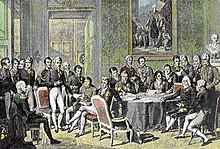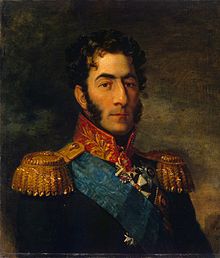Katharina Bagration

Duchess Catherine Pavlovna Bagration Russian Екатерина Павловна Багратион , born Countess Catherine Pavlovna Skavronskaya , (* 7. February 1783 in the Russian Empire , † May 21 / June 2. 1857 in Venice ) was a Russian aristocrat who at the Congress of Vienna diplomatic among the Ladies played a prominent role.
Life
Katharina was the eldest daughter of the diplomat and count Pawel Martinowitsch Skawronski (1757-1793) and his wife, the court lady Katharina Wassiljewna Engelhardt (1761-1829), a daughter of Basil Andreiwitch Engelhardt, Count of Smolensk , and Helena Alexandrovna Potemkin. On her mother's side she was a great niece of Field Marshal Grigory Alexandrovich Potjomkin and on her father's side the great niece of Tsarina Katharina I.
After the early death of her father, she grew up together with her younger sister Maria, who later became Countess von der Pahlen and Countess Ojarowski, in the care of Russian Tsarina Catherine II , whom she called " Grand-mère ", in Saint Petersburg . The two girls received a comprehensive education for the time and were fluent in French , German , English and Italian . In 1798 her mother married the Italian ambassador of the Order of Malta , Giulio Renato Litta Visconti Arese (1763-1839).
On September 2, 1800, she was married in Gatchina to the much older general Prince Pyotr Ivanovich Bagration (1765-1812), the eldest son of Prince Ivan Bagration from the royal dynasty of the Georgian Bagratids . The marriage, which was reportedly unhappy, remained childless. In 1801, Tsar Paul I annexed the Kingdom of Georgia, which under King Herakleios II from the House of Bagration had concluded a protection treaty with Tsarina Catherine II. A conspiracy against the Tsar, who wanted to ally himself with Napoleon Bonaparte against Great Britain and in which her husband had been involved, forced the couple to flee Russia.
In March 1801 the prince returned to Saint Petersburg alone after the tsar was assassinated, as Katharina had to stay in Dresden because of pneumonia . For a few weeks she stayed with his friend, Prince Czartoryski, and his wife, the writer Izabella von Flemming .
Here Princess Bagration met the Austrian envoy and diplomat Count Klemens Wenzel Lothar von Metternich (1773-1859) and threw herself into a love affair without hesitation . The nickname given to the princess because of her always daring cleavage comes from the Dresden period : she was called the "Naked Angel" behind closed doors. The relationship ended when Metternich was called back to Vienna . A daughter, Marie-Clementine Bagration (born November 10, 1803 in Dresden, † May 26, 1829 in Paris ) emerged from the liaison with Count Metternich . Clementine lived with the Metternich family from 1814/15 until she married the Danish Count Otto von Blome (1795-1884) on July 12, 1828 . She died the following year, eight days after the birth of their only child.

After years of separation, Katherina and Metternich saw each other again in Paris at the coronation of Napoléon Bonaparte , and later in Vienna, where Katharina acted as an agent for her cousin, Tsar Alexander I - she officially represented Russia's social interests. Princess Bagration was already a widow at the time of the Congress of Vienna. Her husband, General Bagration, died on September 24, 1812 after the Battle of Borodino . At the Congress of Vienna she danced through the nights at the side of Tsar Alexander and formed the radiant and swarmed center of lavish celebrations. She was courted by countless men, including Crown Prince Wilhelm von Württemberg .
After the Congress of Vienna, Princess Bagration lived in Paris. In her house on Rue St. Honoré she ran a successful literary salon which was frequented by literary and political celebrities. In her second marriage, Princess Katharina married the British diplomat John Hobart Caradoc , 2nd Baron Howden (1799–1875) on January 11, 1830 , from whom she soon separated. She died in 1857 on a trip to Italy .
A gathering of so many important and idiosyncratic personalities as at the Congress of Vienna could not take place without tensions of a political nature, but also not without scandals and affairs. For the Viennese, these amorous affairs of the Congress of Vienna are more interesting than its political results. The Promenade am Graben was primarily about the latest love affairs.
Never before have beautiful and famous women played such a lasting role at an international conference that dealt with the reorganization of so many states. Catherine played an important role in European diplomacy.
literature
- Antonius Lux (ed.): Great women of world history. 1000 biographies in words and pictures . Sebastian Lux Verlag , Munich 1963, p. 39.
- Erwin Angermayer (ed.): Great women of world history. 1000 biographies in words and pictures . Verlag Kaiser, Klagenfurt 1998, ISBN 3-7043-3064-7 (reprint of the Wiesbaden 1976 edition).
- Egon Caesar Conte Corti : Metternich and the women . Europa Verlag, Vienna 1948/49
- From the French Revolution to the Congress of Vienna. 1789-1815 . 1948.
- From the fall of Napoleon to the end of the Chancellor's life. 1815-1859 . 1949.
- Stella K. Hershan : The naked angel ("The naked angel"). Gryphon-Verlag, Munich 2004, ISBN 3-935192-81-9 (reprint of the Munich 1972 edition).
- Lada Nikolenko: The beautiful Russian women. Illustrated biographies of famous beauties from the 18th and 19th centuries . Mir eV, the Center for Russian Culture in Munich, Munich 1996.
Web links
Individual evidence
- ^ Kimbell Art Museum Exhibition Catalog: Catherine Vassilievna Engelhardt , 1982.
- ↑ Ekaterina I Skavronska, Tsarina of Russia on thepeerage.com , accessed October 6, 2015.
- ↑ The Napoleon Series.org: Peter Bagration: The Best Georgian General of the Napoleonic Wars
- ↑ Stella K. Hershan: The naked angel. Fritz Molden Verlag, Munich 1972, ISBN 3-217-00327-6 .
- ↑ genealogy.euweb.cz: Online Gotha: Metternich
- ↑ Bodo Harenberg (ed.): Chronicle of women. Chronik-Verlag, Dortmund 1988, ISBN 3-611-00064-7 .
| personal data | |
|---|---|
| SURNAME | Bagration, Catherine |
| ALTERNATIVE NAMES | Skawronska, Katharina Pavlovna; Hobart Caradoc, Catherine; Bagration, Katharina Pavlovna; Багратион, Екатерина Павловна (Russian) |
| BRIEF DESCRIPTION | Russian aristocrat and mistress |
| DATE OF BIRTH | February 7, 1783 |
| PLACE OF BIRTH | Russian Empire |
| DATE OF DEATH | May 21, 1857 |
| Place of death | Venice |

